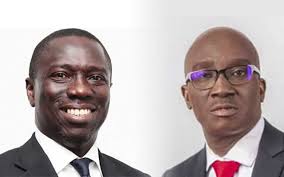As legal fireworks shift to the apex court, tension simmers across Edo State, with citizens and stakeholders awaiting the Supreme Court’s decision on the appeal filed by the Peoples Democratic Party (PDP) and its governorship candidate, Mr. Asue Ighodalo, challenging Governor Monday Okpebholo’s victory in the 2024 gubernatorial election.
This follows dismissals by both the election tribunal and the Court of Appeal, which upheld the Independent National Electoral Commission’s (INEC) declaration of Okpebholo of the All Progressives Congress (APC) as winner with 291,667 votes. Ighodalo came second with 247,274 votes, while Labour Party’s Olumide Akpata trailed with 22,763 votes.
At the heart of Ighodalo’s appeal are allegations of substantial non-compliance with the Electoral Act, flawed collation processes, and questionable conduct by election and security officials perceived to be allies of a senior political figure. Among other concerns, the PDP contended that the lack of serial numbers on Form EC 25B and discrepancies between ward-level collated results and polling unit data compromised the integrity of the process.
Tribunal Chair Justice Wilfred Kpochi had dismissed the petition, citing insufficient evidence and the failure of the PDP to present relevant witnesses like polling unit officials. The Appeal Court concurred, ruling that the petitioners “dumped documents” on the tribunal without proper oral testimony to validate their claims.
However, legal observers and democracy advocates argue that the courts missed the point. According to them, the PDP’s complaint centered not on polling unit conduct, but on discrepancies in INEC documentation that could be independently verified. They cited Sections 51(2), 72(1), and 137 of the Electoral Act to argue that over-voting and document integrity do not necessarily require oral witnesses when official INEC documents — especially Certified True Copies — clearly reveal inconsistencies.
Prominent legal minds have accused the lower courts of “judicial abdication,” saying they failed to scrutinize the evidence with the rigor demanded by electoral jurisprudence. Some drew parallels with the Supreme Court’s verdict in Ihedioha v Uzodimma, where documentary evidence carried more weight than witness count.
As the matter now sits before the Supreme Court, expectations are high that the apex bench will display independence and judicial courage, especially given its recent corrective judgments in gubernatorial appeals from Plateau and Kano states.
Citizens, rights groups, and opposition voices see this as a crucial test for Nigeria’s democracy and the judiciary’s commitment to electoral integrity. “The Supreme Court must rise to the occasion,” a senior advocate involved in the case remarked. “This is not just about who becomes governor — it’s about the credibility of our democracy and whether evidence truly matters in our courts.”



